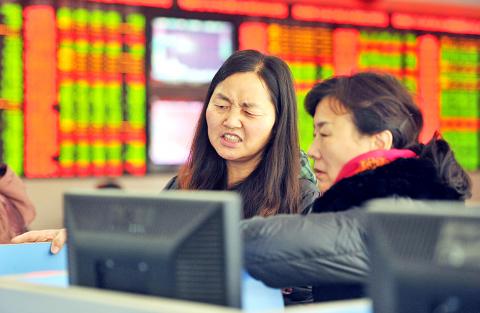Shares in Taiwan closed in negative territory on the first trading day of the new year, pulled down by a fall on Wall Street at the end of last week and cautious sentiment ahead of the Jan. 16 presidential and legislative elections, dealers said.
The market was also caught in a downward spiral seen around Asia, triggered by a heavy sell-off in China that forced the suspension of trading in Shanghai.
The TAIEX closed down 223.80 points, or 2.68 percent, at 8,114.26, after moving between 8,109.09 and 8,326.33. Turnover totaled a relatively low NT$76 billion (US$2.29 billion) during the session.

Photo: AFP
It was the biggest fall on the first trading day of a new year on the Taiwan Stock Exchange since 1999.
Hua Nan Securities Co (華南永昌投顧) chairman David Chu (儲祥生) said the sell-off followed a 1.02 percent drop in the Dow Jones Industrial Average in the US on Thursday last week.
Many investors are staying on the sidelines ahead of the elections, given the uncertainties in the market, he said.
The abolishment of the capital gains tax on profits from trading stocks, which was passed by the Legislative Yuan in November last year and took effect yesterday, led to heavy selling of several stocks that went public last year.
OBI Pharma Inc (浩鼎), the most expensive stock in the biotech sector, which rose from its listing price of NT$310 per share in March last year to its recent level of more than NT$600, closed 7.2 percent lower at NT$608.
Financial stocks dropped 3.52 percent yesterday.
In China, the worst-ever start to a year triggered a trading halt in more than US$7 trillion of equities, futures and options, putting the nation’s new market circuit breakers to the test on their first day.
Trading was halted at about 1:34pm after the CSI 300 Index dropped 7 percent. An earlier 15-minute suspension at the 5 percent level failed to stop the retreat, with shares extending losses as soon as the market reopened.
Traders said the halts took effect as anticipated without any major technical problems.
The world’s second-largest stock market began the year on a down note after data showed manufacturing contracted for a fifth straight month and investors anticipated the end of a ban on share sales by major stakeholders at the end of this week.
Under the circuit breaker rules finalized last month, a move of 5 percent in the CSI 300 triggers a 15-minute halt for stocks, options and index futures, while a move of 7 percent closes the market for the rest of the day.
The CSI 300 fell as much as 7.02 percent before trading was suspended. The Shanghai Composite Index fell 6.9 percent.
The sell-off rippled throughout the region. Japan’s Nikkei 225 closed down 3.1 percent, Hong Kong’s Hang Seng Index finished 2.68 percent lower, South Korea’s KOSPI closed 2.17 percent lower and Singapore’s Straits Times Index finished down 1.47 percent.

AGING: As of last month, people aged 65 or older accounted for 20.06 percent of the total population and the number of couples who got married fell by 18,685 from 2024 Taiwan has surpassed South Korea as the country least willing to have children, with an annual crude birthrate of 4.62 per 1,000 people, Ministry of the Interior data showed yesterday. The nation was previously ranked the second-lowest country in terms of total fertility rate, or the average number of children a woman has in her lifetime. However, South Korea’s fertility rate began to recover from 2023, with total fertility rate rising from 0.72 and estimated to reach 0.82 to 0.85 by last year, and the crude birthrate projected at 6.7 per 1,000 people. Japan’s crude birthrate was projected to fall below six,

US President Donald Trump in an interview with the New York Times published on Thursday said that “it’s up to” Chinese President Xi Jinping (習近平) what China does on Taiwan, but that he would be “very unhappy” with a change in the “status quo.” “He [Xi] considers it to be a part of China, and that’s up to him what he’s going to be doing, but I’ve expressed to him that I would be very unhappy if he did that, and I don’t think he’ll do that. I hope he doesn’t do that,” Trump said. Trump made the comments in the context

SELF-DEFENSE: Tokyo has accelerated its spending goal and its defense minister said the nation needs to discuss whether it should develop nuclear-powered submarines China is ramping up objections to what it sees as Japan’s desire to acquire nuclear weapons, despite Tokyo’s longstanding renunciation of such arms, deepening another fissure in the two neighbors’ increasingly tense ties. In what appears to be a concerted effort, China’s foreign and defense ministries issued statements on Thursday condemning alleged remilitarism efforts by Tokyo. The remarks came as two of the country’s top think tanks jointly issued a 29-page report framing actions by “right-wing forces” in Japan as posing a “serious threat” to world peace. While that report did not define “right-wing forces,” the Chinese Ministry of Foreign Affairs was

PREPAREDNESS: Given the difficulty of importing ammunition during wartime, the Ministry of National Defense said it would prioritize ‘coproduction’ partnerships A newly formed unit of the Marine Corps tasked with land-based security operations has recently replaced its aging, domestically produced rifles with more advanced, US-made M4A1 rifles, a source said yesterday. The unnamed source familiar with the matter said the First Security Battalion of the Marine Corps’ Air Defense and Base Guard Group has replaced its older T65K2 rifles, which have been in service since the late 1980s, with the newly received M4A1s. The source did not say exactly when the upgrade took place or how many M4A1s were issued to the battalion. The confirmation came after Chinese-language media reported